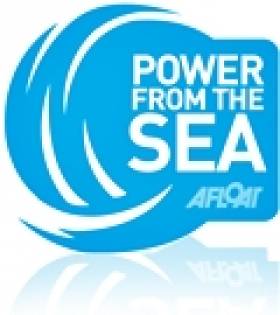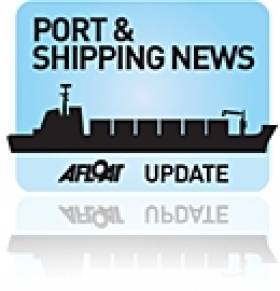Displaying items by tag: River Avoca
#POWER FROM THE SEA - This morning the wind farm turbine installation vessel Sea Energy, departed Wicklow Bay having spent over a fortnight based in Wicklow Port, where her Danish crew celebrated Christmas Day, writes Jehan Ashmore.
The Esbjerg registered vessel operated by A2 Sea, arrived in the week before Christmas to work at Airtricity's Arklow Bank Wind Farm, but the nature of the work was based on internal operations only at the seven turbine facility, which each structure scaling to a height of over 70 metres / 240 feet.
Upon completion of her work, she returned to Wicklow where her crew spent the festive season in port with a Christmas tree complete with lights! at the bow.
She remained in the harbour into the New Year and during the recent spate of heavy weather until finally departing yesterday on Little Christmas, where she overnighted in the bay.
With four towering supporting jack-up legs each 32 metres high, this enables her to carry out offshore crane operations with greater control. In addition the vessel is raised completely above the water to gain elevation to assist mounting the pre-assembled wind-turbine components from her deck cargo.
She can work in waters of up to 24 metres and as she rests on the sea-bed this provides a more stable working platform.
Sea Energy presented a distinctive profile while in port as she 'sat' close to the Packet Quay, as her jack-up legs make mooring ropes redundant.
The quay is the main commercial quay and during this week she vacated the berth to allow regular caller Scot Isles (2001/2,595grt) which arrived with a cargo of sawn packaged timber products from Scandinavia. Owned by Scot Line, the vessel remained in the port for two days and then departed for Warrenpoint.
The Wicklow Port Company also specialise in dry-cargoes, lead, and scrap-metal as previously reported, to read more click HERE.
It is somewhat unusual for vessel movements in Wicklow to berth outside the harbour piers, as in the case with Sea Energy.
She shifted berths to the seaward side of the West Pier and again she sat with jack-legs lowered in water depths of six metres, leaving a clearance of around two metres below the keel.
Although Arklow is closer to the wind-farm than Wicklow, Sea Energy's 3,332 gross tonnes is too large to be accommodated as the port on the River Avoca has a has lower water depth.
The Future’s Green, Bright and Orange
This month ASN are due delivery of the 4,700 gross tonnes Arklow Bridge, the second 'B' class newbuild was also built by the Dutch company of Bodewes Shipyards B.V. She is the fifth vessel to carry this name since Arklow Shipping was founded in 1966.
The Arklow Bridge is registered in St. John's the capital of the Caribbean island of Antigua where she will be flagged. Antigua became an associated state of the Commonwealth until it was disassociated from Britain 30 years ago.
Her sister Arklow Brook entered service this year and is designed with two holds with a total (grain and bale) capacity of 9473.1m3 or an equivalent of 33,4524 ft3.
For cargo-separation the holds can be sub-divided by a portable bulkhead in up to 8 positions. In addition to carrying agricultural-based cargoes, the 116m (OA) overall long vessel can handle 177 (TEU) containers in the hold and another 88 can be stowed on top of the hold's hatch covers. Both the holds are fitted with dehumidifier's.
The power-plant is derived from a MaK 6M32C 2999kW main engine with a Renk gearbox and Berg controllable pitch propeller that provides around 12 knots.
With the entry of Arklow Bridge, the combined fleet is over 40 ships that trade in the north-west of Europe and the Mediterranean. For further vessel statistics of the sisters click here and for a photo of the new vessel click this link.
Asides the Rotterdam based operation of ASN, the Irish side of the company is the largest indigenous owned shipping company in terms of Irish-flagged and registered tonnage. Arklow is not only the headquarter's of ASL but the homeport is also where the vessels are registered.
- Dublin Port
- Co. Wicklow
- Arklow Shipping
- Newbuilds
- The Netherlands
- Arklow Shipping Ltd
- Ports and Shipping News
- Caribbean
- DryDock
- Antigua
- British
- Dublin Port news
- Arklow Bridge
- Arklow Brook
- ASN
- Arklow Shipping B.V.
- Irishflagged
- Irishregistered
- Arklow Future
- Bodewes Shipyards
- Dutchflagged
- Antiguaflagged
- Mak
- The Commonwealth
- River Avoca































































